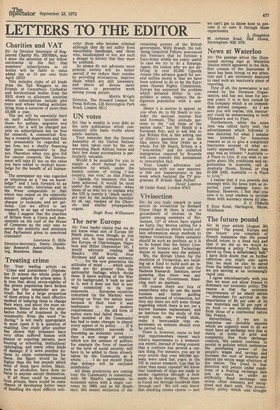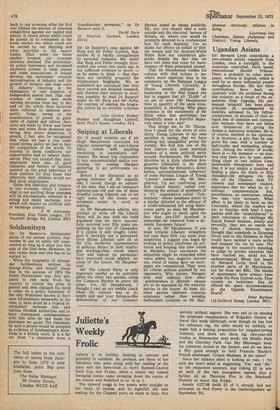The future pound
Sir: In your article (August 26) entitled 'The pound, Europe and the future' you complain of French insistence that the pound should return to a fixed rate and that if we did so we would be abandoning a policy "which has saved us from a deflationary hell." I have little doubt that on further reflection you might also agree that we must be also be saved from the inflationary hell to which we are moving at an increasingly rapid rate.
I agree wholeheartedly with you that we must not allow France to dominate our economic policy. The reason is that the economic requirements of an island nation — dependent for survival on the importation of 80 per cent of itS raw materials and 50 per cent of its food — are entirely different from those of a continental nation like France.
Nevertheless, if we are to maximise our invisible exports which we urgently need to do we must have an exchange rate that Is stable in terms of gold and completely free from exchange controls. We cannot continue to persist in policies which undermine the purchasing power of the people's wages and savings and increase the cost of imports and distort the whole wage structure of the nation. The trend in that direction will persist under conditions of a floating exchange rate just as much as under an artificially fixed exchange rate unless other elements are recognised and dealt with. The protectionist policy which was brought
back to our economy after the first war limited the amount of overseas competition against our capital and labour. It raised prices which could be passed on to consumers in the home market but which could not be carried by our shipping and other activities in the export trades. Thus, while the home market boomed our overseas interests declined. The protectionist policy buttressed and increased excessive powers in trade unions and trade associations. It helped develop the movement towards nationalisation of industry and the growth of mergers and huge units of industry resulting in the elimination of vast numbers of independent master men. That vast number of master men made varying decisions from day to day and on the whole their decisions were reflected in national prosperity. Today, owing to the concentration of power in giant units of capital and labour, decisions are made by fewer and fewer men and when those decisions are wrong they prove disastrous. It should, I feel, also be recognised that when we had a free trade sound money policy we had to face the competition of the world. To succeed in those conditions our industrialists had to behave themselves. They too insisted that their employees were also of good character and fathers of families insisted on the good behaviour of their children for they knew that otherwise their children would not find good employment. Given this elasticity and freedom in our economy which I believe vital to our survival those elements will be automatically reflected in a strong and stable exchange rate which will require no artificial aids or exchange control.
S. W. Alexander President, Free Trade League, 177 Vauxhall Bridge Rd, London SW1



































 Previous page
Previous page